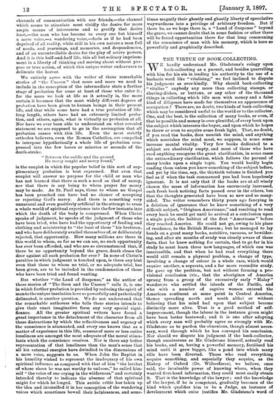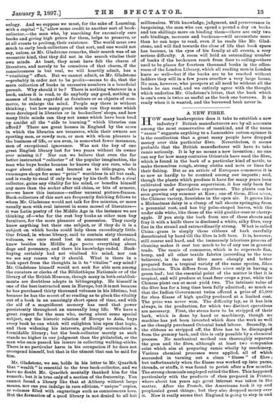THE VIRTUE OF BOOK-COLLECTING.
WE hardly understand Mr. Gladstone's eulogy upon book-collecting as a pursuit, and besides quarrelling with him for his sin in lending his authority to the use of a barbaric word like "vitalising," we feel inclined to dispute his judgment as over-kindly. Why should book-collecting " vitalise " anybody any more than collecting stamps, or shaving-dishes, or buttons, or any other of the thousand things in collecting which idle men with money and a false kind of diligence have made for themselves an appearance of occupation ? There are, no doubt, two kinds of book-collecting which may be considered useful to the world or to the collector. One, and the best, is the collection of many books, or even, if that be possible and money is over-plentiful, of every book upon the subject which interests the buyer, and upon which he hopes to throw or even to acquire some fresh light. That, no doubt, if you read the books, does nourish the mind, and anything which nourishes the mind must, we suppose, in some sense increase mental vitality. Very few books dedicated to a subject are absolutely empty, and most of those who have read anything recognise the great clarification, in some cases the extraordinary clarification, which follows the perusal of many books upon a single topic. You would hardly begin reading them unless you knew something of the subject before, and yet by the time, say, the thirtieth volume is finished you feel as if when the task commenced you had been hopelessly ignorant. It is not only that if the books are at all wisely chosen the mass of information has enormously increased, each fresh book noticing facts passed over in the others, but that the thoughts generated have been so new and so many- sided. The writer remembers thirty years ago fancying in a delirium of ignorance that he knew something of a very difficult subject, " Origines Americanre," and resolving to read every book he could get until he arrived at a conclusion upon a single point, the habitat of the first "Americans" before they reached America. He could not go, owing to his place of residence, to the British Museum ; but he managed to lay hands on a great many books, nutritive, vacuous, or bewilder- ing, and after six months of study was clearly aware of these facts, that he knew nothing for certain, that to go far in his study he must learn three new languages, of which one was inaccessible, and that when he had read everything there would still remain a physical problem, a change of type, involving a change of colour in a whole race, which would require another, a separate, and a far more recondite study. He gave up the problem, but not without forming a pro- visional conclusion (viz., that the aborigines of America sprang from a group of the excessively early " Malay " wandercra who settled the islands of the Pacific, and who with a number of captive women entered the American continent at some point in Central America, thence spreading north and south alike) or without believing that his mind had upon that subject become distinctly more alive. That is a good method of self- improvement, though the labour in the instance given might have been better bestowed; and it is one after adopting which every man will probably agree so strongly with Mr. Gladstone as to pardon the obnoxious, though almost neces- sary, word through which he has conveyed his conclusion. Nor should we dispute his judgment if the book-collector, though omnivorous as Mr. Gladstone himself, actually read his books, and so, having a powerful memory, fertilised his mind until it grew bigger, like a pond into which many rills have been diverted. Those who read everything acquire something, and especially they acquire, as the Bishop of Oxford (Dr. Wilberforce), we believe, once said, the invaluable power of knowing where, when they wanted first-hand information, they could most easily obtain it. That is the knowledge of the lawyer; and the knowledge of the lawyer, if he is competent, gradually becomes of the kind which qualifies him to be a Judge, an instance of development which Quite justifies Mr. Gladstone's word of
eulogy. And we suppose we must, for the sake of Learning, with a capital "L," allow some credit to another sort of book- collector,—the man who, by searching for excessively rare books and giving high prices for them, helps to preserve, or at all events to prolong, their existence. The world must owe much to early book-collectors of that sort, and one would not say, unless, as Mr. Gladstone remarks, their search was of an eccentric kind, that they did not in the search vitalise their own minds. At least, they must have felt the charm of literature, and merely to be conscious of that charm, if the consciousness is but real, we will heartily admit, has a " vitalising " effect. But we cannot admit, as Mr. Gladstone —probably in order not to be prolix—seems to do, that the mere collection of books in excessive numbers is a beneficial pursuit. Why should it be ? There is nothing whatever in a book, unless it is read, to do anybody any good, nothing in masses of books regarded as furniture or as objects of com- merce, to enlarge the mind. People say there is without thinking ; but how many great minds can they name which were developed in libraries or in booksellers' shops, and how many little minds can they not name which have been bred -up amidst all the "aids to learning" which libraries can afford ? There are great houses in England by the score in which the libraries are treasures, while their owners are sporting men, or rowdy men, or men with whom pleasure is the business of life, or are even, in somewhat fewer instances, men of exceptional ignorance. Was not the key of one great English library lost for two years without its owner ever missing it ? Nor can we believe that even the far better instructed "collector" of the popular imagination, the man who buys books because he knows they are rare, who is eager about editions and learned as to title-pages, who rummages shops for some "prize" worthless in all but cash, and is ready to steal if only be may by his theft baffle a rival collector, gains any vitality for his mind, or benefits himself any more than the seeker after old china, or bits of armour, or—we knew this instance—rather unusual picture-frames. Book-collectors of this sort are frequently finicking fellows to whom Mr. Gladstone would not talk for five minutes, or more usually men with real interest in some morsel of literature— it was Latin poetry of the Middle Age in the instance we are thinking of—who for the rest buy books as other men buy furniture, for the mere pleasure of possession. They rarely know anything but their one subject, or if they do it is a subject on which books could help them exceedingly little. Our friend, in whose library, said to contain sixty thousand volumes, we once stood lost in amazement and alarm, knew besides his Middle Age poets everything about dogs and yeomanry, and there his knowledge ended. Book- buying certainly had not vitalised his mind, nor can we see any reason why it should. What is there in a book apart from the thoughts in it to " vitalise " any mind ? Mr. Gladstone himself would not seek for able men among the curators or clerks of the Bibliotheque Nationale or of the library of the British Museum, though many in both establish- ments are doubtless adepts in bibliography. He himself is one of the best instructed men in Europe, but it is not because he has purchased thirty thousand volumes in his lifetime, but because he has the secret of so reading as to pluck the vitality out of a book in an amazingly short space of time, and with the aid of a magnificent memory has used that power persistently throughout an unusually long life. We have a great respect for the man who, caring about some special subject, say the historic relation of Europe to Asia, buys every book he can which will enlighten him upon that topic, and then widening his interests, gradually accumulates a formidable library ; but the book-collector merely as such stands no higher in our judgment than the philatelist, or the man who once passed his leisure in collecting walking-sticks. There is no particular harm in his occupation if he does not overspend himself, but that is the utmost that can be said for Mr. Gladstone, we see, holds in his letter to Mr. Quaritch that " wealth " is essential to the true book-collector, and we have no doubt Mr. Quaritch mentally thanked him for the remark; but it is true only of a section of the fraternity. You cannot found a library like that at Althorp without large means, nor can you indulge in rare editions, "unique" copies, or volumes filled with engravings such as connoisseurs love. But the formation of a good library is not denied to all but millionaires. With knowledge, judgment, and perseverance in bargaining, the man who can spend a pound a day on books and ten shillings more on binding them—there are only two safe bindings, morocco and buckram—will accumulate more than he can hope to read, even if he reads like Mr. Glad- stone, and will find towards the close of life that book space has become, in the eyes of his family at all events, a very serious difficulty. A room will hold an astounding number of books if the bookcases reach from floor to ceiling—there used to be places for fourteen thousand books in the office- room of the London Library, which all reading men in London know so well—but if the books are to be reached without ladders they will in a few years overflow a very large house. No man, however, who prospers at all need be without all the books he can read, and we entirely agree with the thought which underlies Mr. Gladstone's letter, that the book which is one's own is twice as useful as the book one borrows. It is ready when it is wanted, and the borrowed book never is.















































 Previous page
Previous page